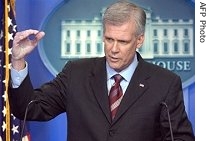2007年VOA标准英语-White House Presses Pakistan on al-Qaida Havens
搜索关注在线英语听力室公众号:tingroom,领取免费英语资料大礼包。
(单词翻译)
By Scott StearnsWashington
18 July 2007
The White House is stepping up pressure on Pakistan's president, General Pervez Musharraf to oust1 al-Qaida terrorists from remote areas along the border with Afghanistan. VOA White House Correspondent Scott Stearns has the story.
 |
| Tony Snow (file photo) |
The terrorist group's resurgence4 in those areas has been known for some time. But Snow says this week's National Intelligence Estimate provides a moment of focus. It says al-Qaida is using that safe haven to protect and rebuild key elements of its ability to attack the United States.
U.S. officials trace the resurgence to an agreement President Musharraf reached with tribal leaders in 2006 to withdraw government troops if those leaders agreed to block al-Qaida and the Taleban from operating in the area.
White House spokesman Snow says President Bush does not regret taking President Musharraf at his word about that plan, but it has not worked. "Pakistan is a sovereign government and Pervez Musharraf is a man who, as president of Pakistan, and as the general, has an obligation and a challenge to do what he thinks is going to be most effective in securing peace within his own land and also at the same time obviously dealing5 with many of the troublesome issues that have to do with the incursion across the border of Taleban fighters into Afghanistan. The one thing we can say for sure is that the plan, as well-intentioned as it was, didn't work," he said.
When something does not work, Snow says, you have to fix it, and that is what is going on now.
Pakistan's government has rejected as unsubstantiated the U.S. intelligence report that al-Qaida is regrouping in northwestern Pakistan. A foreign ministry6 statement says Pakistan would take action to eliminate any al-Qaida hideouts but that it needs concrete information and intelligence from the United States.
With 85-thousand Pakistani security forces at the border and more forward deployments underway, Snow says President Bush believes President Musharraf is serious about solving the problem.
Pakistan has a 100-million-dollar development plan for the region, which Snow says America will supplement with 150 million dollars over five years.
Washington provides 300 million dollars a year in military financing, reimburses7 the government for counter- terrorism costs, and has provided fixed-wing aircraft and helicopters for surveillance.
Snow says President Musharraf wants additional funding to support Frontier Corps8 members who are doing most of the fighting in those tribal areas, and the Bush Administration is looking for ways to meet that request.
White House Homeland Security Adviser9 Fran Townsend says President Bush has not ruled out unilateral action against al-Qaida and has made perfectly10 clear that he will pursue what she calls "actionable targets" in Pakistan or anywhere else.
But the president wants to work with the Pakistani leader, who Townsend says is clearly committed to taking-on terrorists. "Just this month, they've lost upwards11 of 80 soldiers in the fight, so there should be no question that Pakistan takes it seriously for their own reasons, and we are working with them to encourage them to deny Pakistan as a safe haven. They don't want Pakistan as a safe haven for themselves," he said.
Despite setbacks in Pakistan's tribal areas, White House Spokesman Snow says the United States is determined12 to get al-Qaida leader Osama bin13 Laden14.
The Central Intelligence Agency last year disbanded a ten-year effort to hunt down bin Laden, reassigning those agents to the broader fight against terrorism.
 收听单词发音
收听单词发音 




